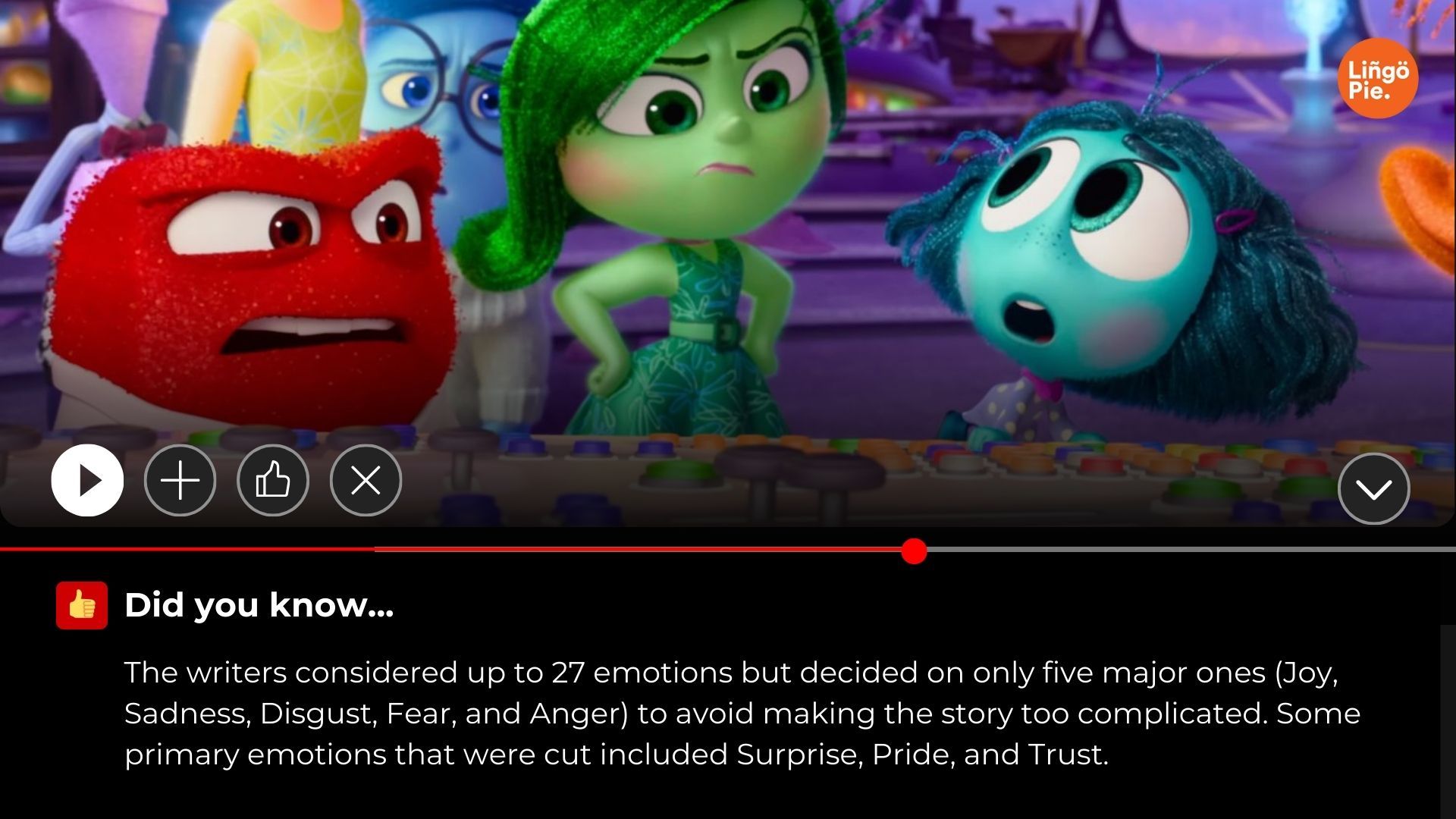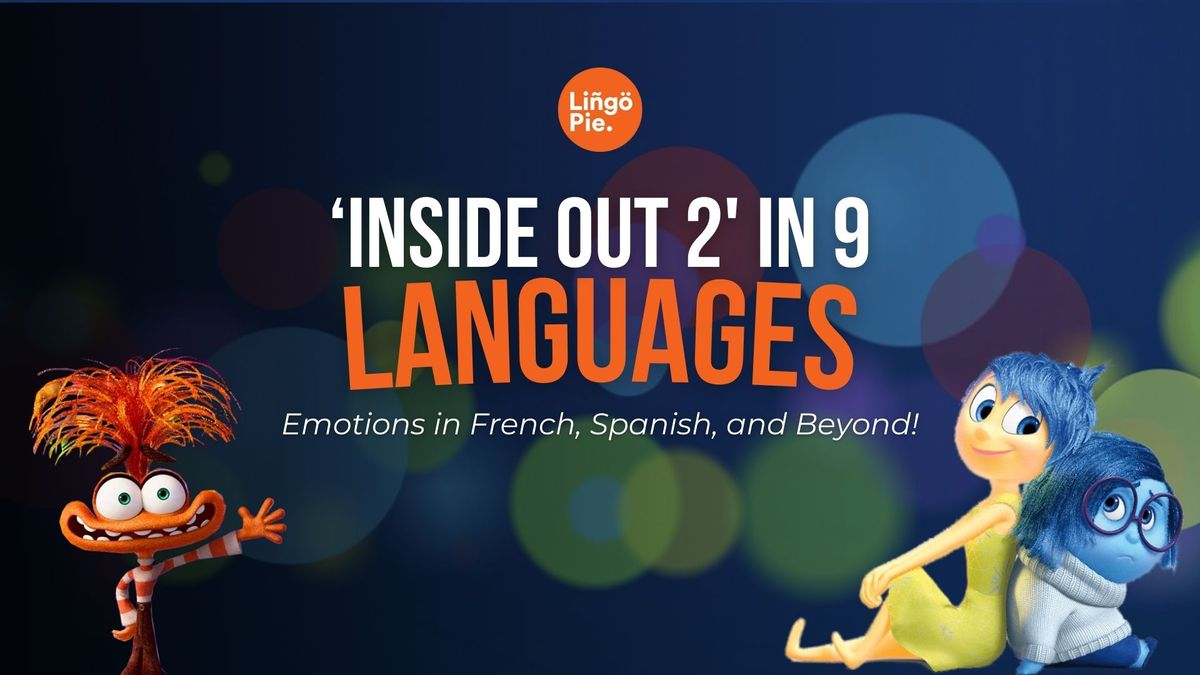In the first movie, we fell in love with the adorable and relatable emotions guiding Riley through her everyday life. Now, as the hit sequel takes the world by storm, we can't help but wonder: how do these lovable characters sound in different languages across the globe?
Just think about it - what if the word for Joy in Spanish or French sounded way more bubbly and energetic than the English version? Or if Anger came across even angrier and full of fire in another language? Hearing the Emotions in new languages could make them feel totally fresh and different!
That's why in this blog post, we're going to take a trip around the globe and find out how the "Inside Out 2" emotions sound in nine different languages. And who knows, you may just find a new favorite interpretation!
Key Takeaways
- Hearing the Emotions' names and personalities translated into languages like Spanish, French, German, Japanese, etc. provides fascinating new interpretations and shades of these iconic characters.
- The way certain emotions manifest more intensely or with more nuance in particular languages (e.g. Anger in Spanish, Sadness in German) reminds us that emotional expression is shaped by culture and linguistics.

Inside Out 2 Characters In Different Languages
Alright, so we all know and love the original Emotions from Inside Out - Joy, Sadness, Anger, Fear, and Disgust. They were the perfect embodiment of those core feelings we experienced as kids.
But now that Inside Out 2 has arrived, Pixar is taking us into the emotional universe of a teenager. And just like the rest of us, her emotional world has...well, gotten a bit more complicated! So while our old friends remain, the sequel introduces four completely new Emotions that perfectly capture the complicated, angst-ridden headspace of adolescence: Anxiety, Envy, Embarrassment, and Ennui.
Let's get to know each other better below and how these emotions translate in different languages.
Joy (Amy Poehler)
As tough as it is for the relentlessly cheerful Joy, Inside Out 2 made her realize that she must accept that pure bliss can't always be the top priority during the adolescent years. It's a heartwarming arc as she comes to terms with the fact that she has to work in harmony with Anxiety and the newcomers. It's an impactful reminder that to really achieve contentment, we have to embrace all the parts of ourselves, not just the purely joyful side.
| Language | Translation |
|---|---|
| English | Joy |
| Spanish | Alegría |
| Italian | Gioia |
| Portuguese | Alegria |
| French | Joie |
| German | Freude |
| Russian | Радость (Radost) |
| Japanese | 喜び (Yorokobi) |
| Korean | 기쁨 (Gi-ppum) |
| Chinese | 快乐 (Kuài lè) |
Sadness (Phyllis Smith)
As the personification of sorrow, grief, and all things dreary, Sadness was initially seen as a downer that Joy tried to sideline in the first film. However, after that journey where they saw Sadness's important role in helping Riley work through painful memories and emotions, the other Emotions like Joy gained a newfound appreciation for the worth of feeling sad sometimes. No longer treated as the resident sad sack, Sadness maintains a prominent position in Riley's mind.
| Language | Translation |
|---|---|
| English | Sadness |
| Spanish | Tristeza |
| Italian | Tristezza |
| Portuguese | Tristeza |
| French | Tristesse |
| German | Traurigkeit |
| Russian | Печаль (Peh-chal) |
| Japanese | 悲しみ (Kanashimi) |
| Korean | 슬픔 (Seul-pum) |
| Chinese | 悲伤 (Bēishāng) |
Anger (Lewis Black)
When new Emotions like Anxiety, Envy, and Embarrassment barge into Headquarters in Inside Out 2, the red-faced, explosive Anger (voiced by Lewis Black) absolutely loses it. But surprisingly, the typically rage-filled Anger becomes one of the most surprisingly deep characters through an unexpected journey.
As the relentlessly positive Joy starts feeling defeated by the harsh realities of teenage angst, Anger temporarily ditches his trademark fury to uplift and motivate her. It's an unexpectedly heartwarming story arc amidst all the laughs that Anger provides.
| Language | Translation |
|---|---|
| English | Anger |
| Spanish | Enojo |
| Italian | Rabbia |
| Portuguese | Raiva |
| French | Colère |
| German | Ärger |
| Russian | Гнев (Gnyev) |
| Japanese | 怒り (Ikari) |
| Korean | 분노 (borok) |
| Chinese | 愤怒 (Fènnù) |
Fear (Tony Hale)
Our favorite neurotic, overly cautious Emotion is back! Bill Hader once again voices the nervy, purple Fear whose sole job is to protect Riley from potential dangers and threats she can see.
However, in Inside Out 2, Fear finds his position being overtaken by the new Emotion Anxiety, who is laser-focused on defending Riley from unseen worries and worst-case scenarios. As Anxiety's obsessive fretting takes over, the more pragmatic Fear starts to feel...well, fearful about becoming irrelevant.
| Language | Translation |
|---|---|
| English | Fear |
| Spanish | Miedo |
| Italian | Paura |
| Portuguese | Medo |
| French | Peur |
| German | Angst |
| Russian | Страх (Strakh) |
| Japanese | 恐れ (Osore) |
| Korean | 소심 (sosim) |
| Chinese | 恐惧 (Kǒngjù) |
Disgust (Liza Lapira)
In Inside Out 2, Disgust's importance is ramped up as she becomes a key player in helping Joy recover Riley's "lost belief tree" before the newly arrived Emotions can completely derail the poor girl's life. I guess her finely-tuned sense of what's cool vs. cringe-worthy proves invaluable.
| Language | Translation |
|---|---|
| English | Disgust |
| Spanish | Asco |
| Italian | Disgusto |
| Portuguese | Nojo |
| French | Dégoût |
| German | Ekel |
| Russian | Отвращение (Otvrashcheniye) |
| Japanese | 嫌悪 (Ken'o) |
| Korean | 까칠 (Kkachil) |
| Chinese | 厌恶 (Yànwù) |
Anxiety (Maya Hawke)
In her flustered desperation to ensure teenage Riley has the perfect social life, Anxiety takes the nuclear option - she literarily tries to demolish the personality foundations Joy and the others had built up over the years and rebuild Riley's identity from scratch.
While positioned as somewhat of an antagonist, Anxiety emerges as one of Inside Out 2's hands-down funniest and most endearing characters. After all, we can all relate to that breathless, frenzied spiral of worried overthinking once in a while, right?
| Language | Translation |
|---|---|
| English | Anxiety |
| Spanish | Ansiedad |
| Italian | Ansia |
| Portuguese | Ansiedade |
| French | Anxiété |
| German | Angst |
| Russian | Тревога (Trevoga) |
| Japanese | 不安 (Fuan) |
| Korean | 불안 (Bul-an) |
| Chinese | 焦虑 (Jiāolǜ) |
Envy (Ayo Edebiri)
Joining the lineup of fresh Emotions in Riley's mind is the mischievous and covetous Envy, voiced by comedy star Tiffany Haddish. Alongside newcomers like Ennui, Embarrassment, and Anxiety, Envy makes it her mission to help socially insecure Riley fit in at hockey camp.
To achieve this goal, the green-eyed monster specifically fixates on Valentina, the effortlessly cool girls' hockey leader. Envy becomes obsessively determined to make Riley emulate and achieve Valentina's envied status by any means necessary.
| Language | Translation |
|---|---|
| English | Envy |
| Spanish | Envidia |
| Italian | Invidia |
| Portuguese | Inveja |
| French | Envie |
| German | Neid |
| Russian | Зависть (Zavist') |
| Japanese | 嫉妬 (Shitto) |
| Korean | 부럽 (burop) |
| Chinese | 嫉妒 (Jídù) |
Embarrassment (Paul Walter Hauser)
One of the most uniquely hilarious new additions is the oversized, cuddly Embarrassment, voiced by comedian John Mulaney. True to his name, this Emotion's whole shtick is being perpetually mortified and desperately hiding his reddened face inside his sweatshirt hoodie.
What really makes the character work is how relatable those gut-punch moments of awkwardness and humiliation feel. We've all been Embarrassment at some point, whether it was bombing in front of a crowd or just feeling out of place among peers.
| Language | Translation |
|---|---|
| English | Embarrassment |
| Spanish | Vergüenza |
| Italian | Imbarazzo |
| Portuguese | Constrangimento |
| French | Embarras |
| German | Verlegenheit |
| Russian | Смущение (Smushcheniye) |
| Japanese | 恥 (Haji) |
| Korean | 당황 (Danghwang) |
| Chinese | 尴尬 (Gāngà) |
Ennui (Adèle Exarchopoulos)
In contrast to the manic energy of Anxiety or Embarrassment's fidgety nature, Ennui can't be bothered to actually get up and use the Headquarters' control board. No, this blasé feeling prefers to laze around on the couch, disinterestedly scrolling through her phone while still managing to negatively influence Riley's behavior and mindset.
Plaza's trademark dry line delivery and unimpressed persona capture Ennui's total lack of investment or care about, well, anything really. The character's robe-clad lounging and eye-rolling at the other Emotions' frantic efforts is a spot-on embodiment of teenage ennui.
| Language | Translation |
|---|---|
| English | Ennui |
| Spanish | Aburrimiento |
| Italian | Noia |
| Portuguese | Tédio |
| French | Ennui |
| German | Langeweile |
| Russian | Скука (Skuka) |
| Japanese | 倦怠感 (Kentaikan) |
| Korean | 따분 (ttabun) |
| Chinese | 烦躁 (Fánzào) |
*Note that for some languages like Japanese, there is no direct single-word translation, so I provided the closest corresponding phrase/expression.


Role of Language in Emotional Expression
While the Emotions feel universal, the way we express them through language can be quite different across cultures. Inside Out 2 highlights this by having each Emotion voiced by international talent in multiple languages.
Some emotions may come across as more intense or nuanced in certain tongues compared to others. For example, the passionate flair of the Spanish language could make Joy sound even more exuberant. Or the poetry of German might give Sadness a deeper melancholy.
Then you have tonal languages like Mandarin Chinese, where precise inflections and cultural context behind emotional concepts could make Anger or Fear feel distinct from their English versions.
So in addition to being awesome family fun, Inside Out 2 low-key encourages exploring new languages as a path to greater emotional self-awareness. Giving voice to our inner selves through another tongue enriches our understanding of what it truly means to be human.
Speak A Foreign Language With Lingopie
After watching the Emotions spring to life in multiple languages throughout Inside Out 2, you might feel inspired to explore emotional expression through a new language yourself. That's where Lingopie comes in!
Our innovative app immerses you in real-world movies and shows to naturally build vocabulary, including how native speakers truly articulate feelings like joy, sadness, anger, and more. The more engaging content you watch, the more valuable cultural insights you'll gain into the nuances of emotional expression in that language.
So what are you waiting for? Take the first step towards a more emotionally self-aware, culturally curious you with Lingopie!







![7 International Films Debuting At Tribeca Film Festival [2025]](/blog/content/images/size/w300/2025/06/tribeca-film-festival.jpg)


